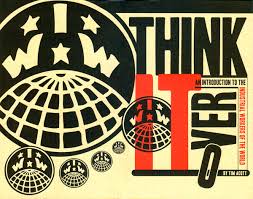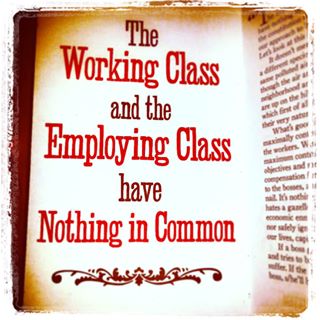Think about it (part 2 sure 3)
The following is the second part of an introductory pamphlet written by a fellow worker from the Portland IWW, Oregon, Tim Acott. Text in English here.
Union democracy
The unions to which most working people belong today, when they have it, are among the most undemocratic organizations in the world. Officers are appointed instead of being elected, agreements are made behind closed doors and then presented to the base for approval, the nonconformist premises are sequestrated by the central and the union bosses are rooted for life, never facing a return to real work, if they were there to start.

Is it then surprising to note that membership is declining and that workers' confidence in their leaders is almost non-existent ? Is it a miracle that we lose the gains that we fought hard for in the past ? Is it a surprise that the favor and convenience contract, that the union boss and the enriched bureaucrat are clichés associated with the modern worker movement, while the basic organizer is seen as a picturesque figure from the distant past ?
So that we defend ourselves, us and our families, we must unite in unions. We need our combined strength to face the wealthy and their governments. We need the union, but it must be democratic. If not, how could he defend our interests and not those of the bosses ? How else can we control our own struggles, and choose our own goals and challenges. We need democratic unions, base control, and democracy at work to lead our own struggles. No union bureaucrat
totally fought for workers, and none will. We have to defend ourselves, ensemble, in a democratic union. If we can't control our union and its leaders, then we cannot trust them. It's that simple.
Wobble is a verb
The essential value of a union is what it can do. What it can do for you and your loved ones, and for your whole class. What can you do with him ? How can you use it to accomplish what you have to do ? Do is the verb. Action is the subject.
When we come together at work to respond to common problems by force of our collective action, we do something. We don't talk about it, even if it’s important, and we're not looking to advertise or make it a big show, even if these things can be useful at a convenient time. We act. Fire. Make. We are the subject, to put it in terms of grammar, the problem is our object, on which we act collectively to change it.
In the construction industry, the verb "wobble" in English is often used to designate a group action that seeks to respond to a problem at work, or a problem with the boss, as is often the case at work. "Wobbler" work, is to disengage, slow down, or go together to the boss to "chat" during paid hours. More directly, is to come together to face problems directly. This is what it is about.
It happens everywhere, All the time. It’s a necessary part of everyday work life. You can also do it. You and your colleagues, at work, can "wobbler"
the situation to improve it. It’s work control, and this is the thing that we have to establish and protect, for our own safety and health, in order to ensure good compensation for our precious time, to have fun, enjoy, and relax from the boredom and loneliness that floods our lives in this modern working world.
The key to good "wobbling" is union. It’s the small union of cooperation and concerted efforts among comrades, people with the same needs and circumstances – the people you work with every day, for example. Alone, we are weak and helpless. Together, we are full of power. We only have to organize this power to handle it, for our common good, in order to build a better world. Together we can win. We only have to do it. Act now.
The working class and the employing class have nothing in common
"The working class and the boss class have nothing in common" tells us the preamble to the Constitution of SITT-IWW. This is the basis of our approach to labor relations and unionism. Let’s study this statement for a few moments.
 It does mean that workers and bosses are different species., they do not breathe the same polluted air and drink the same water, even if the water and the air of a working-class district are much more disgusting than on the hill. This implies that the two classes, that do exist, are in opposition to even their nature.
It does mean that workers and bosses are different species., they do not breathe the same polluted air and drink the same water, even if the water and the air of a working-class district are much more disgusting than on the hill. This implies that the two classes, that do exist, are in opposition to even their nature.
What's good for bosses - cheap labor, maximum controlled and passive - is bad for workers. What's good for the working class - maximum control at work, on working conditions, methods and objectives, and maximum compensation for our precious time - is the fear of the bosses, and these will fight tooth and nail against it. It's nothing personal. No more than a lion hates a gazelle. It's just natural hostility, impersonal and economic, which cannot be bypassed or easily
ignored. This is the principle that governs our lives, capitalist and mass combined.
If a boss tries to make workers his friends, his business will suffer. If a worker tries to make the boss his friend, he or she will be more easily exploited and betrayed. Natural economic enemies. You can be part of the same parish or drink at the same bar, but you cannot care for their interests long without endangering yours. It is quite simple and clear for all workers who pay attention to everyday life. A smart boss never forgets. It’s not at all esoteric ; it's common sense and pragmatism.
What it implies in terms of unionism is very radical. That is to say : an orientation towards the source of problems and solutions. This implies class solidarity. All workers have the same interests and the same class enemy. This implies union democracy. We are all involved together, and only bottom-up control can reliably and continuously guide the union. The only people we can trust are ourselves, and a union that we cannot directly control is a
great danger to our interests.
This therefore implies militancy, because it illuminates the situation of an ongoing class war (that’s the appropriate term, in view of the resulting destruction) which must be won to complete it. We must fight at all costs to defend our interests and our security. It's the war, fellow workers. But as ugly as it is,
we are stuck there, and we can only get out of it by organizing and fighting the right fight.
The working class and the employing class have nothing in common. It’s a common sense truth, and we cannot afford to ignore it.


Trackbacks & Pingbacks
[…] Portland IWW member, Oregon, Tim Acott. Text in English here. Part One Part Two Labor Law in a nutshell Labor Law is a subject of study that we […]
Leave a Reply
Want to join the discussion?Feel free to contribute!